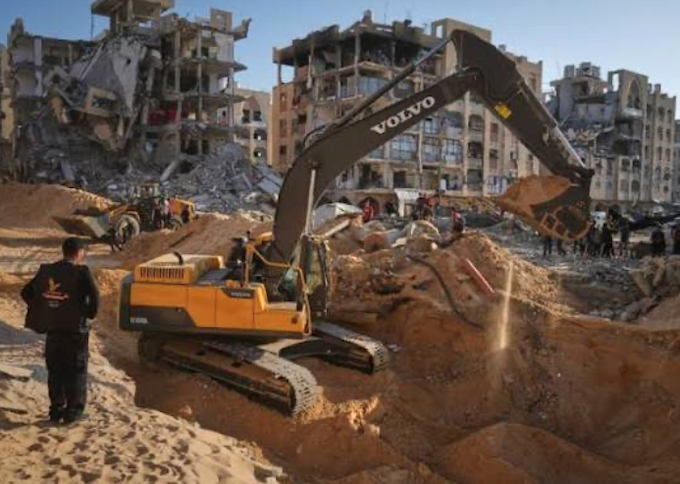
The New Arab
Palestinian officials have accused Israel of using the issue of captive bodies in the Gaza Strip as a pretext to violate the ceasefire and prolong its military presence in the devastated territory.
The officials said Israel was exploiting the matter to justify new attacks, stop aid entering the territory, and delay the reopening of the Rafah crossing with Egypt.
The ceasefire, which came into effect on October 10, was meant to allow humanitarian relief and a gradual return to calm. Instead, Israel has carried out repeated airstrikes and tightened restrictions on aid deliveries.
- READ MORE: Israel returns bodies of Palestinians to Gaza, some show signs of torture
- More Gaza reports
Overnight between Tuesday and Wednesday, the Israeli army launched dozens of raids on Gaza City. At least 100 Palestinians were killed and many more wounded.
The Israeli army claimed the attacks were in response to delays in handing over Israeli remains and to the killing of a soldier by a sniper in Rafah, which is under full Israeli control.
Hamas said this week that it had recovered two additional Israeli bodies — one in Khan Younis and another in the Nuseirat refugee camp. Its armed wing, the Al-Qassam Brigades, delayed handing them over because Israel “breached the agreement” with new airstrikes on Gaza.
Despite limited Egyptian equipment entering the Gaza Strip to help with recovery efforts, Israel continues to block the entry of heavy machinery and specialist teams.
11 bodies remain lost
With the two bodies newly recovered, Hamas said 11 remain lost in Gaza. Israeli officials admit they lack information on about five of them, meaning they may not be located soon.
Khalil al-Hayya, head of Hamas in Gaza, said finding the remaining bodies was extremely difficult. Vast destruction and the deaths of fighters who had guarded captives had made recovery operations almost impossible.
At least 10,000 Palestinian bodies are believed to be buried under the rubble.
Since the truce began, Palestinian factions have handed over 20 living Israeli captives and about 15 bodies. Some were killed by Israeli strikes during the war; others died on 7 October 2023, at the start of the conflict.
Ahmad al-Tanani, director of the Arab Centre for Research and Strategic Studies, said Israel created the very conditions that now make recovery so difficult.
“This has become a political pretext to sustain a state of no war, no peace and to block the second phase of President Donald Trump’s plan,” he told Al-Araby Al-Jadeed.
He said not all the bodies were held by Hamas. “They are divided among different factions, and some of those who knew their locations were killed in the war,” he explained.
Al-Tanani added that some Israeli captives were likely killed by the Israeli army’s bombing of sites that held captives.
Israel blocks equipment
“Israel refuses to allow the equipment and technical teams that could help,” he said. “The factions in Gaza have offered every guarantee and even broadcasted recovery attempts live to prove good faith.”
He accused Israel of spreading “a false narrative that the resistance is manipulating the issue” to justify continuing its assault and maintaining constant tension in Gaza. This, he said, gave the Israeli army “freedom of movement” and weakened Egyptian mediation efforts aimed at stabilising governance in the Strip.
Tel Aviv, he added, was working to block any path toward a new political reality or a reorganisation of Palestinian leadership.
Israeli affairs analyst Firas Yaghi said Israel was using the bodies as “a political card” to stop progress toward the next stage of Trump’s plan, which calls for a phased Israeli withdrawal from Gaza and renewed political talks.
“Netanyahu is using the issue to justify Israel’s continued military presence deep inside Gaza under the pretext of searching for the missing,” Yaghi told Al-Araby Al-Jadeed.
Gaza’s changed landscape
He said Israeli intelligence “knows that some bodies were lost under the rubble due to intense bombardment that changed Gaza’s landscape completely”.
Israeli opposition leader Yair Lapid, he noted, had warned against letting the issue block the ceasefire. But “the current government prefers to exploit it for domestic political gain”.
Yaghi also criticised the United States for what he described as a weak position.
“Trump’s administration and its allies are giving Netanyahu wide freedom of action,” he said. “They ignore repeated ceasefire violations and the ongoing closure of Rafah.”
“If Washington decided to apply real pressure,” Yaghi added, “the plan could still move forward regardless of the handover of bodies. But for now, the US does not want to weaken Netanyahu”.











































